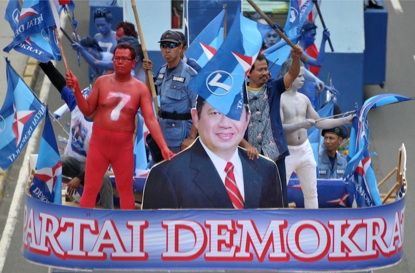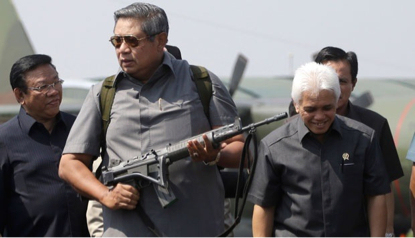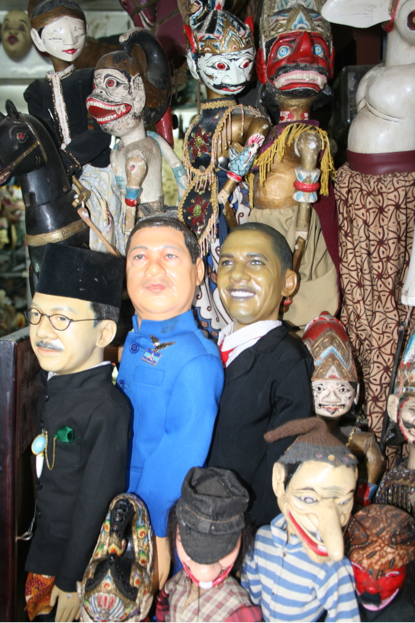“Looking forward to voting?” I smile at my new Indonesian friend.
“Ah well Ibu, that’s if we have one,” he says, shaking his head gently.
I cocked an eyebrow and he explained.
“People in Jakarta are saying that the president is looking for ways to extend his term indefinitely. He’ll make up some procedural excuse, or use some little known law to thwart the elections. Either way, it’s not certain we’re even going to have an election in April”.
I shouldn’t have been so surprised. Rumours and conspiracy theories are part and parcel of Indonesian politics. Political speculation has played a starring role in all of the major turns in Indonesian politics.
In 1965, rumours of an impending military coup incited ‘preemptive action’ by the September 30th movement and the counter-move that brought Suharto to thirty-two long years of power. The sudden death of Suharto’s wife Ibu Tien in 1996 was shrouded in gossip that she had actually been shot by her own children during an argument over money. The New Order fell by public protest just two years later.
During elections, of course, paranoia reaches fever point.
A decade ago in 2004, I remember organising observers for Jakarta’s neighbourhood polling booths while the city’s activists and political observers hummed with worry of an imminent military coup. After six years of civilian incompetence and directionless government, the military was ending the democratic experiment.
Suffice to say, the 2004 election went ahead. Ho hum.
Sure, you say, of course it did. Who believes rumour anyway?
It’s easy to mock their crackpot implausibility and grand schemes, but sieving ‘truth’ from rumour is not what makes them interesting. Rumours, conspiracy theories, wild-eyed speculation and oddball theories–these are produced by a political landscape scored by opacity and the legacy of crisis after crisis. The emergence of rumour and conspiracy are markers of a political system in transition. Given what they’ve gone through–is it any wonder that Indonesians have strange memories. Far from alleviating distrust, as Aspinall observes, the fragmentary nature of Indonesia’s unique democracy has only exacerbated it.
In 2004, there was no military coup. Instead, in their first ever-direct presidential election, Indonesians voted in spades for former military general and long-time political actor Susilo Bambang Yudhoyono who collected a rousing 60% mandate. The vehicle for his electoral success, Partai Demokrat (PD), also did well for a new party in the legislative round with 7.45% of the votes.
SBY’s first term, at least the first half of it, proceeded well. Just a few months in the Economist clapped the president on the back and proclaimed Indonesia now “delightfully dull”. The president was admired for his tough stance on corruption, establishing a fearsome Anti-Corruption Commission (KPK) in 2004, a peace deal ending the 29 year long war with Aceh and strong appointments to the finance and economy portfolios.
Stuff was happening! Indonesia’s democracy was consolidating!
And the rumours reflected it.
Returning to Indonesia in 2006, Jakarta’s cabbies regaled me with stories of the president’s power and the legitimacy of his rule. To become president, they insisted, SBY had undertaken an heroic 40 day pilgrimage, “On the way, SBY fought many demons and jin [Islamic spirits]. He collected precious stones [batu] and a kris [prized wavy dagger]”, one explained, flashing the rings on his skinny fingers. Having successfully triumphed and acquired the stuff of power in Java, the presidency was rightfully his.
What does it mean that today’s electoral speculation now connects the historically recurring rumour of the “impending coup” to a man who to all of us once seemed to embody democratic reform. A man whose political legitimacy in the political stronghold of Java was once as solid as the kris he acquired to get it?
To be sure, SBY has had a luck luster second term. His enigmatic presence, once stately and pensive, started to look muddled. Much-needed military, police and bureaucratic reforms stalled in the final years of the first term. The second was blighted by corruption. Scandals implicating the PD’s bright stars and possible successors, Anas Urbaningram, Muhammad Nazaruddin, Angelina Sondakh and Andi Mallarangeng, have wiped out much of the Democratic Party’s credibility.
If that wasn’t bad enough, PD spent these last weeks in parliament possessed by the sudden urge to approve drafts of the Criminal Code and Criminal Procedure Code, both of which were widely criticized as designed to hamstring the KPK. Given that the draft bills have been bouncing around parliament since 2012 (and a decade before that) the sudden urgency seemed timed to PD’s imminent exit from the national legislature.

The Partai Demokrat parade float hits the 2014 campaign trail. Does the key to voters’ hearts lie with Number 7? Photo: AFP.
SBY can’t run another term so these past years have been preoccupied with finding someone who can. With the party’s big stars either in the clink or facing charge, at one point SBY looked like he was going to go dynastic, throwing his weight behind his son. Eventually however, the party dilly-dallied through a list of hopefuls most of whom didn’t actually belong to the party itself lest factional differences explode. The convention process should have polished up the party’s democratic credentials, but all the feuding and backbiting only really seemed boring and unnecessarily ardous and as polling predicted PD’s election results would nosedive from 20.8% to 4.7%, it seemed that no really cared who PD picked anyway.
Last week PD announced that one of its presidential hopefuls Minister for State Owned Enterprises, Dahlan Iskan would be sworn in as a full-fledged party cadre on the first day of campaigning in Magalang, before a 30,000 strong ‘sea of blue’ supporters. That sea turned out to be more of a trickle. Less than a third turned up. Not even SBY made it, opting to stay in Riau instead.
Call ‘em whackos, call ‘em crazies, the conspiracy theorists are right about one thing – unless things improve dramatically, PD’s hope to maintain power is by coup alone.
………
Jacqui Baker is a visiting fellow at the Department for Political and Social Change at the ANU where she lectures in Indonesian politics.
 Facebook
Facebook  Twitter
Twitter  Soundcloud
Soundcloud  Youtube
Youtube  Rss
Rss 
